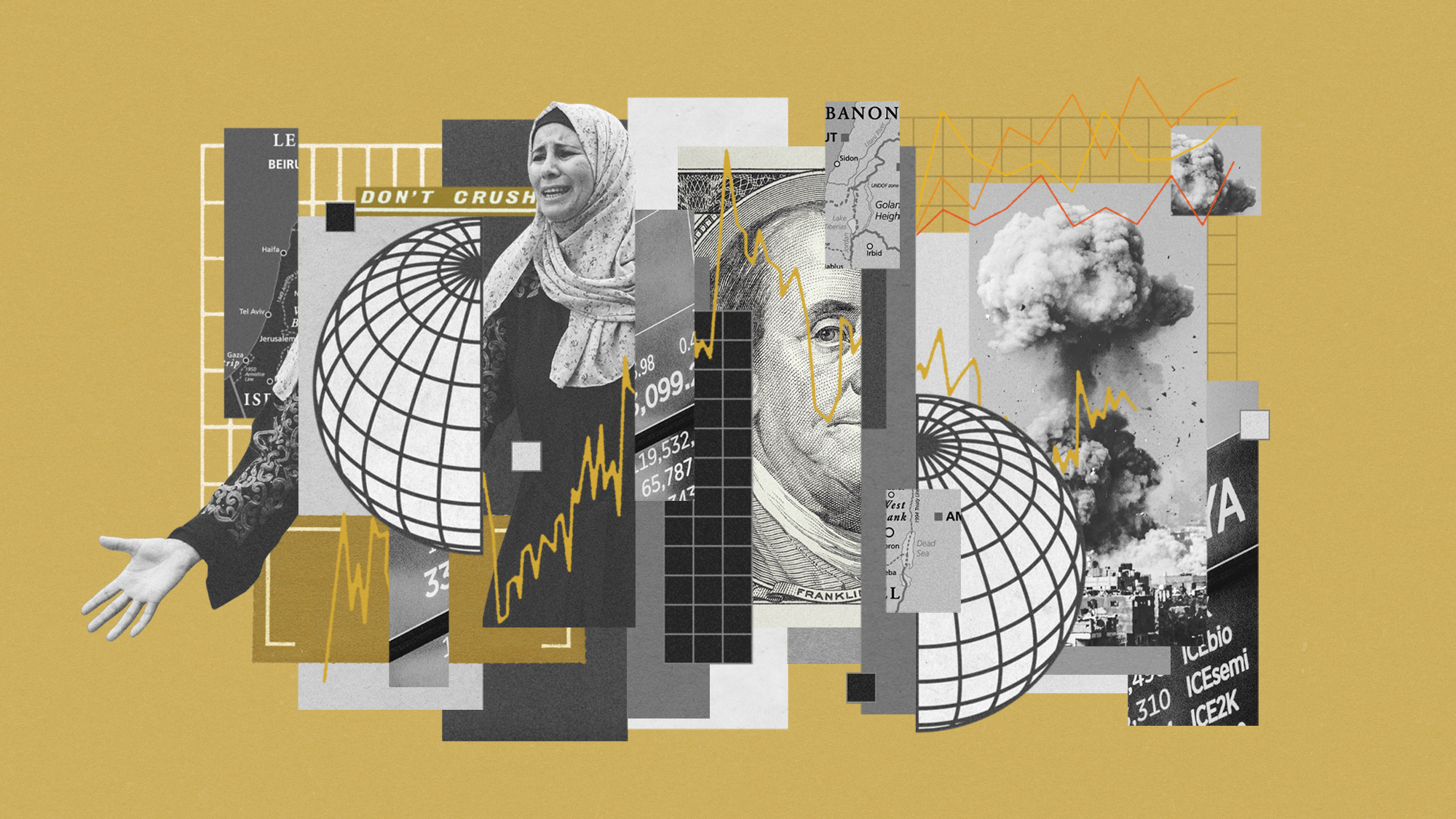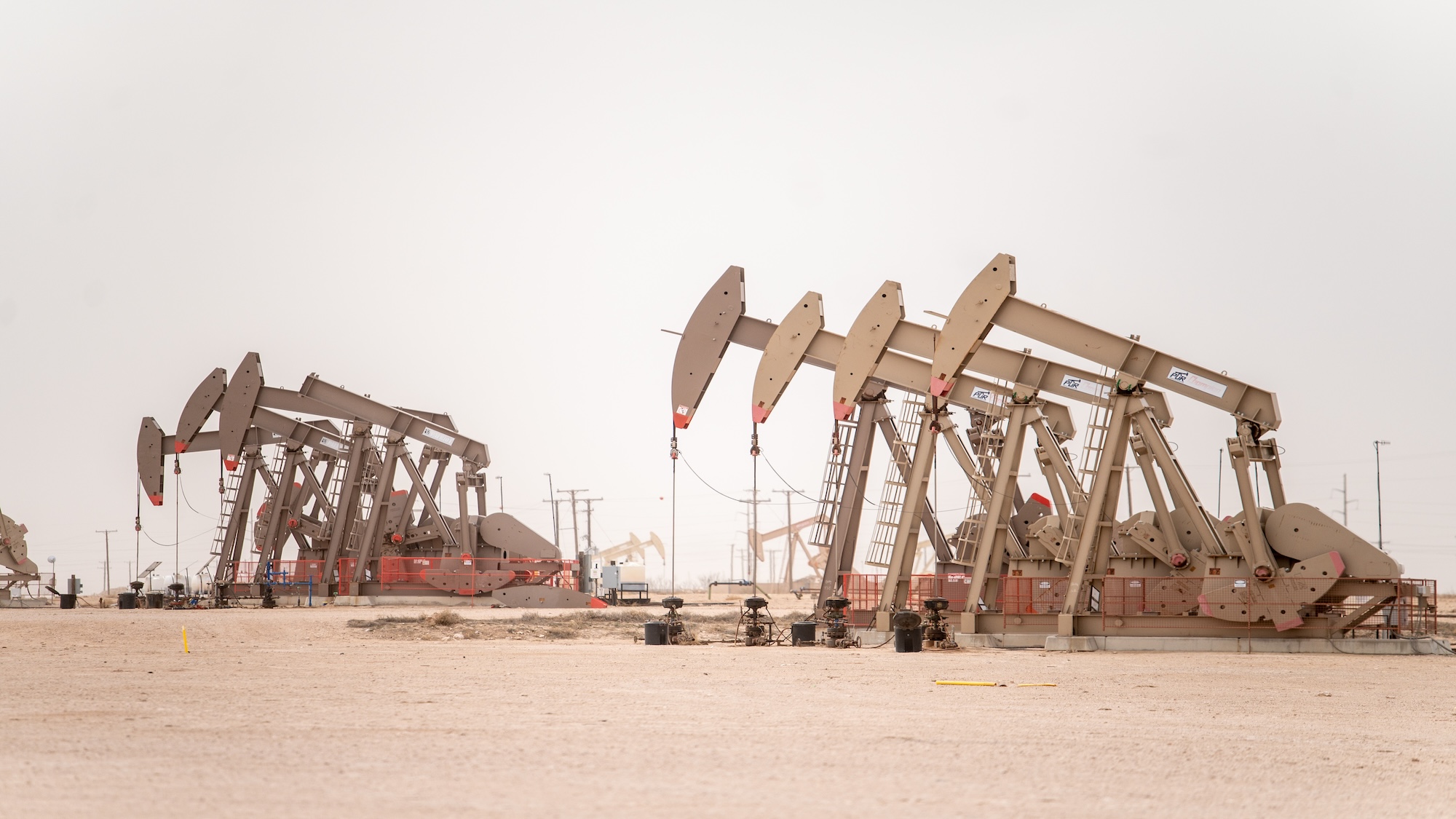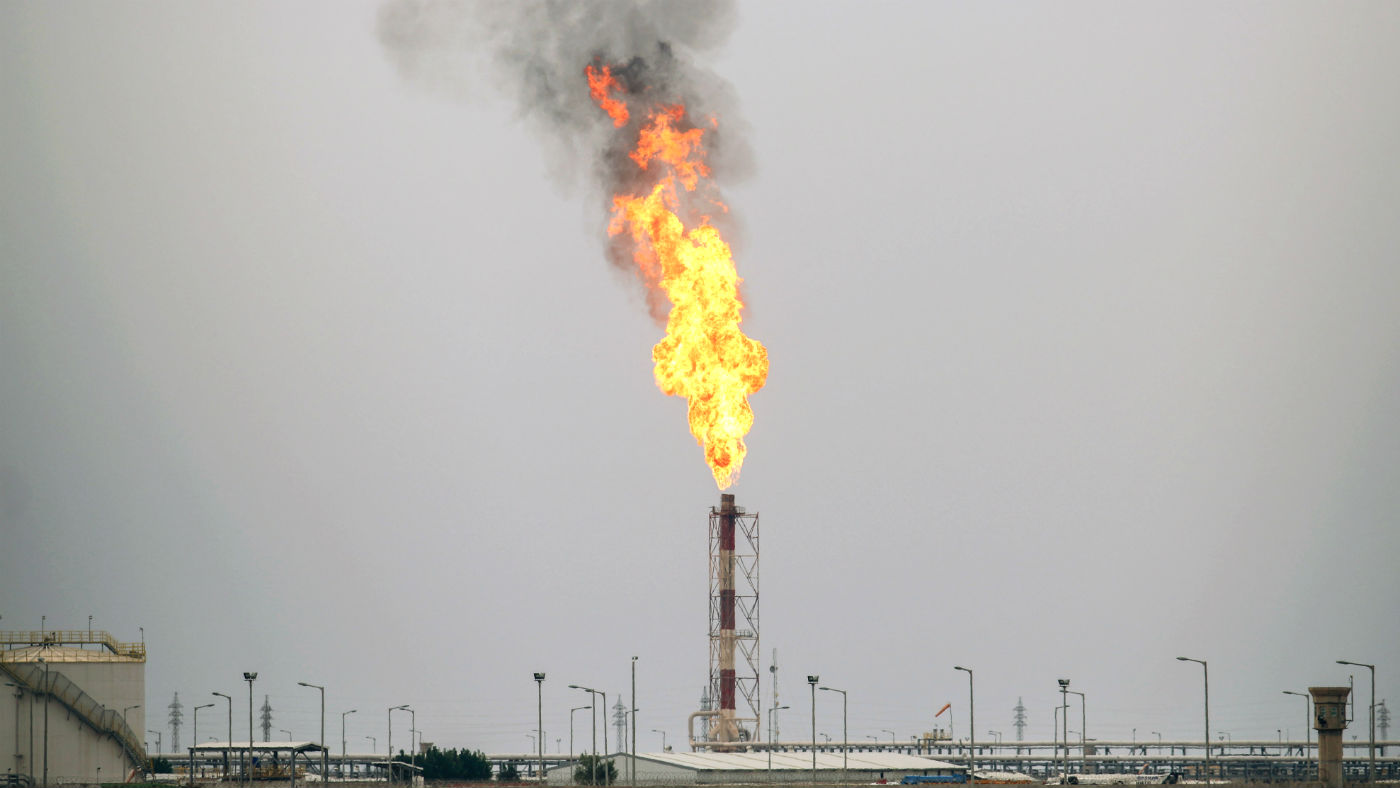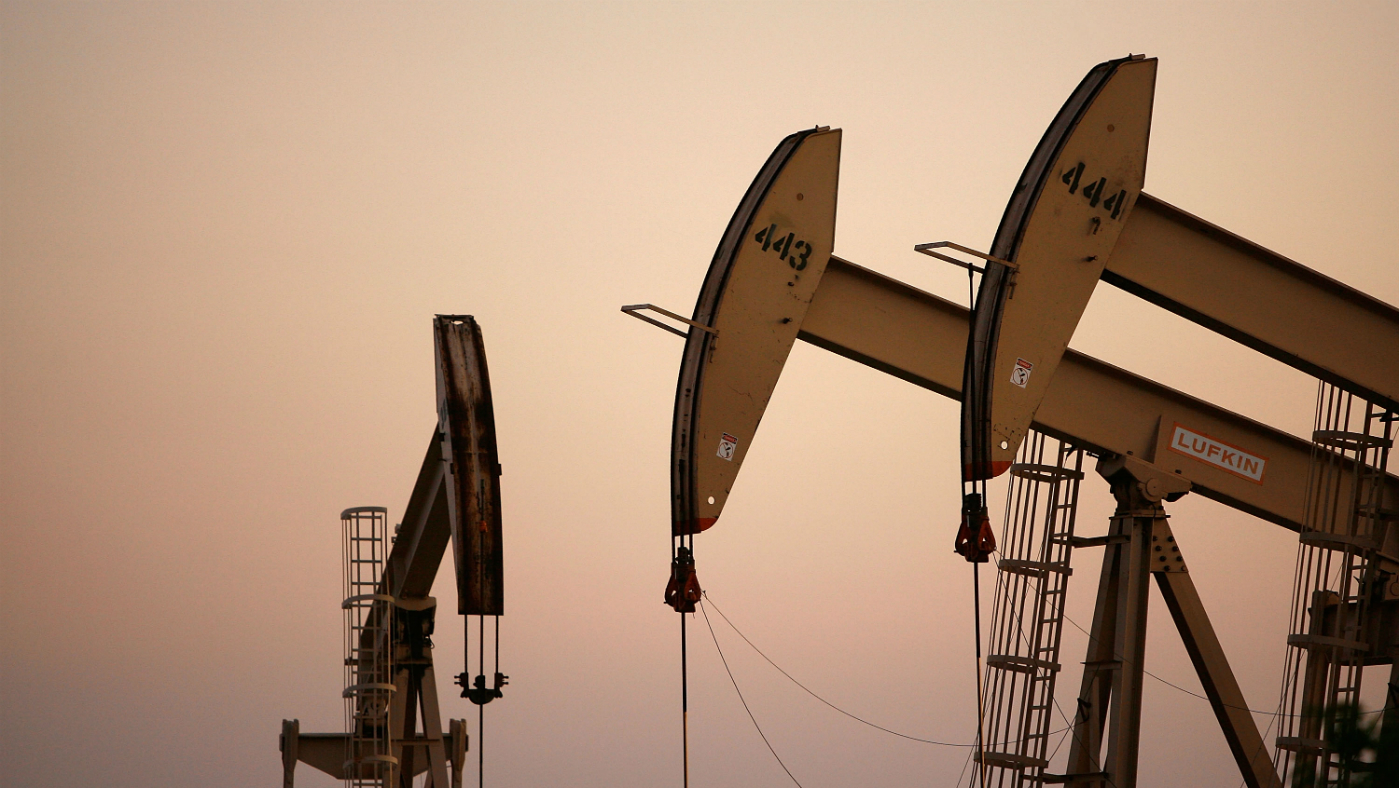Oil price posts two-year highs - but how long can it last?
Brent rose above $59 a barrel this week, its best third-quarter showing since 2004

A free daily email with the biggest news stories of the day – and the best features from TheWeek.com
You are now subscribed
Your newsletter sign-up was successful
14 April
The oil price dipped back from its latest 2016 high yesterday, as traders braced themselves for volatile trading conditions ahead of a critical meeting on supply this weekend.
Having hit $45 a barrel on Tuesday, international benchmark Brent crude fell back around $1 in European trading on Wednesday and then to below $44 overnight, hitting $43.60 a barrel at 9.40am in London today.
The Week
Escape your echo chamber. Get the facts behind the news, plus analysis from multiple perspectives.

Sign up for The Week's Free Newsletters
From our morning news briefing to a weekly Good News Newsletter, get the best of The Week delivered directly to your inbox.
From our morning news briefing to a weekly Good News Newsletter, get the best of The Week delivered directly to your inbox.
A key drag factor was the latest supply report from the US Energy Information Administration, which the Wall Street Journal notes showed a build in domestic stockpiles of 6.6 million barrels.
This followed the first fall in reserves for two months, which some had hoped was a sign the decline in shale oil production amid painfully low prices was starting to rebalance the market.
Another development weighing on prices was data showing an increase in production by Russia and some Opec members, including Iraq, in March. Oilprice.com adds that Saudi Arabia has been adding wells and opening new fields and production could climb this year.
Given this weekend's meeting in Doha, Qatar, hopes to finalise a tentative deal to freeze production at January levels, this is a potentially worrying signal, especially as production might still increase overall because Iran is adamant it will return output to pre-sanction levels.
A free daily email with the biggest news stories of the day – and the best features from TheWeek.com
“We just want to focus on this fantasy that Opec is going to come to an agreement, and ignore the facts that are staring us in the face,” said Stephen Schork, the president of research consultancy Schork Group.
There are positives, however. Most analysts believe some kind of deal will be finalised over the weekend and US drilling is still in decline, dropping below nine million barrels a day last week.
For this reason, the International Energy Agency has said that come what may, it believes oil market will come closer to balancing in the second half of this year - although it has warned it is unlikely there will be big price movements, even if a deal is agreed.
“If there is to be a production freeze, rather than a cut, the impact on physical oil supplies will be limited," it said, according to the Financial Times.
Why the oil price could jump to $60 - or 'collapse' again
13 April
Traders are broadly convinced there will be a deal to freeze most global oil production this weekend and that as a result, the oil price will not return to February's 13-year low.
In fact, while most are predicting that international benchmark Brent crude will at least hold steady above $40 a barrel, some believe the recent rally will continue to push the price back towards the $60 a barrel level seen as the eventual "new normal".
Brent surged four per cent on Tuesday, marking a third consecutive positive move, and at one point hit $45 a barrel. It is holding above $44 even in more circumspect trading this morning.
But analysts are uncertain there will even be an agreement at Sunday's talks in Doha, Qatar, much less that it will mark a turning point for a heavily oversupplied market.
At the extreme end of this more pessimistic forecast, prices "collapse" again. More likely, some say, is a less conclusive outcome that emphasises the market's over-optimistic view at the moment and pushes prices back into the $30s.
The more positive view was put forward in particular by senior figures at Vitol, Trafigura, Mercuria, Gunvor, Glencore and Castleton at a Financial Times conference on Tuesday. Between them, they "sell enough oil to meet almost a fifth of global demand".
Gunvor chief executive Torbjorn Tornqvist said the driver of the market now is "when, not if, the so-called rebalancing occurs" as he suggested "a level like $60 to $70 will secure oil for the foreseeable future".
Helima Croft, the head of commodity strategy at RBS Capital Markets, summed up the more bearish analyst view in an interview with CNBC, saying that without the backing of Iran, an output freeze is difficult for Saudi Arabia to countenance.
She added that the best case scenario was a strong deal that hints at a future accord to cut production, which would send prices soaring. A worst case is "acrimony" and no agreement; anything in between is more likely and will be seen as underwhelming.
"If there's disappointment in the weekend, we probably go back down to where we were two weeks ago, $38. Five or six dollars we could lose... if there's not a clear statement," said Chris Weafer, a senior partner at Macro-Advisory.
Oil price rises ahead of Doha summit, but slump ahead
12 April
Oil prices were at their highest so far this year today, buoyed by the upcoming Doha summit - but Goldman Sachs has warned there may be a post-meeting slump when investors realise there is no magic bullet.
Brent crude hit $43.33 a barrel at 8.42am UK time, after a high of $43.53 earlier in the session – its best performance in 2016. US crude, meanwhile, rose 39 cents to $40.75 a barrel.
The rise was a continuation of better news for oil prices over the past few weeks, after a disastrous fall which has sent prices crashing down for almost two years, reaching a 12-year nadir in January and February.
The price has risen partly because investors are inspired by a long-awaited meeting of Opec and other major oil-producing nations which takes place in Doha, Qatar, this weekend, says Reuters.
Hopes the delegates will agree to limit oil production in order to ease the recent oversupply has boosted the market. The weakness of the US dollar is another reason for today's upturn, says Commerzbank.
But the future does not look rosy, says Goldman Sachs, which warns that the Doha meeting is not likely to offer the "bullish surprise" for which investors are hoping.
Even if a deal to limit production is struck, Goldman Sachs does not believe it will rebalance the market, reports the Daily Telegraph. Oil supplies "may continue to swell as transient outages early this year give way to rising output", says the paper.
A statement from Goldman Sachs reads: "The market has taken comfort in the production freeze discussion and the declining US rig count, [but] we continue to believe that the balancing of the oil market is still far from secured.
"We see risks that even a production agreement could be followed by sequentially rising Opec production given the multitude of potential sources of production growth. We see greater odds that the Doha meeting delivers a bearish catalyst for oil prices.
"Ultimately, we believe the biggest hurdle to reaching any meaningful agreement will be the conflicting Saudi and Iranian stances, with Iran repeatedly stating that it would continue to grow production and regain its market share and its participation to the Doha meeting still uncertain."
Oil price runs out of steam again at $42 ceiling
11 April
The oil price enjoyed a strong rally to end the trading week on Friday, but the advance ran out of stream in very familiar territory.
International benchmark Brent crude jumped more than five per cent during the final session of last week, as positive data from the US exacerbated hopes for a supply deal meeting to take place in Doha, Qatar, this Sunday.
Oilprice.com notes hat the US Energy Information administration revealed another modest fall in domestic production of 14,000 barrels a day, to 9.01 million barrels. Monthly data has been following a similar slow downward trend and had reached 9.18 million barrels in January.
There was also a dip in crude oil stockpiles for the first time in two months, although reserves remain near record levels.
However, having risen close to $42 a barrel, where it opened this morning in London, Brent crude then retreated and was down 0.4 per cent to $41.75 a barrel at shortly after 9am.
This is actually a familiar pattern – Brent has risen to around $42 a barrel several times over the past month or so before falling back, marking a ceiling for a recovery of around 50 per cent since a 13-year low of $27 was reached in February.
The latest pullback was caused by analysts warning that this Sunday's meeting, which could see a number of major producers, including Saudi Arabia and Russia, agree to freeze supplies at January levels, could actually serve to make an entrenched oversupply situation even worse.
"A production freeze at recent production levels would not accelerate the rebalancing of the oil market as Opec (excluding Iran) and Russia production levels have this year remained close to our 2016 average annual forecast of 40.5 million bpd [barrels per day]," Goldman Sachs said, in a client note reported by Reuters.
"We see greater odds that the Doha meeting delivers a bearish catalyst for oil prices... [and] we continue to believe that the balancing of the oil market requires sustained low prices with our [Q2] forecast of $35 per barrel," it added.
Helping to hold prices higher are figures showing potentially increased demand, with decent industrial data coming out of China and Japan and a positive forecast on global demand growth over the next four years from Bernstein.
Oil price back above $40 but will 'struggle to go higher'
08 April
Brent crude rose this morning and was back above the psychologically important $40 a barrel threshold - but some warn it may not be able to advance further.
The international oil price benchmark hit $40.60 at 9.30am in London, up a steady three per cent for the session so far. But this week it has been far from one-way traffic: the oil price had surged as much as five per cent on Wednesday before dipping back on Thursday, as conflicting data emerged on supply and demand in what remains a heavily oversupplied market.
The mid-week increase was propelled by data showing the first fall in crude oil stocks in the US for two months, mostly because of refiners picking up the pace in the face of apparently increased demand for gasoline.
Then yesterday, after seeing the weekly data from the key US delivery hub at Cushing, Oklahoma, analysts reported that reserves there had risen, despite a main pipeline being out of action for five days, reports Reuters.
At the same time in the global market, there was a bearish supply sign in the form of a sizeable boost in exports from Iraq in March, which went from 3.2 to 3.5 million barrels a day. With Iran also pledging to return to pre-sanction output levels, this is an extremely negative sign for hopes that a deal to freeze supplies at January levels will level out Opec production this year.
The other side of the equation is demand, in relation to which sentiment was boosted today by a rise in German exports and optimistic comments on the US economy by the Federal Reserve, triggering the latest upward swing.
Overall, analysts believe the wider picture is still dominated by a supply excess of one to two million barrels a day – and an overhang that will take time to rebalance and will weigh on prices.
"If you zoom out, there's still oversupply and record inventories," said Hans van Cleef, a senior energy economist at ABN Amro in Amsterdam.
Ole Hansen, the head of strategy at Saxo Bank, told the Daily Telegraph: "We see the upside limited on Brent crude at $40 in the short term."
-
 6 of the world’s most accessible destinations
6 of the world’s most accessible destinationsThe Week Recommends Experience all of Berlin, Singapore and Sydney
-
 How the FCC’s ‘equal time’ rule works
How the FCC’s ‘equal time’ rule worksIn the Spotlight The law is at the heart of the Colbert-CBS conflict
-
 What is the endgame in the DHS shutdown?
What is the endgame in the DHS shutdown?Today’s Big Question Democrats want to rein in ICE’s immigration crackdown
-
 How might the Israel-Hamas war affect the global economy?
How might the Israel-Hamas war affect the global economy?Today's Big Question Regional escalation could send oil prices and inflation sky-high, sparking a worldwide recession
-
 Recent mega-mergers could signal a turning point for the US oil industry
Recent mega-mergers could signal a turning point for the US oil industryTalking Point Both Chevron and Exxon have recently spent billions to acquire smaller oil companies
-
 Has Saudi Arabia lost control of oil prices?
Has Saudi Arabia lost control of oil prices?Today's Big Question Kingdom goes it alone to cut production, risking tension with US and reigniting cooling inflation in Europe
-
 US angered by Opec+ oil cut
US angered by Opec+ oil cutSpeed Read Energy prices to rise further as producers slash supply by two million barrels a day
-
 Global oil demand forecast lowered for 2020 and 2021
Global oil demand forecast lowered for 2020 and 2021Speed Read IEA report says jet fuel demand remains the major source of weakness
-
 Are US-Iran tensions flaring again?
Are US-Iran tensions flaring again?In Depth Trump threatens military action over Twitter
-
 Can a deal be struck to raise oil prices?
Can a deal be struck to raise oil prices?In Depth Opec+ will convene today over video link in a bid to boost crude
-
 What do negative oil prices mean?
What do negative oil prices mean?In Depth Perfect storm of oversupply and storage shortages sees producers paying to get rid of US crude